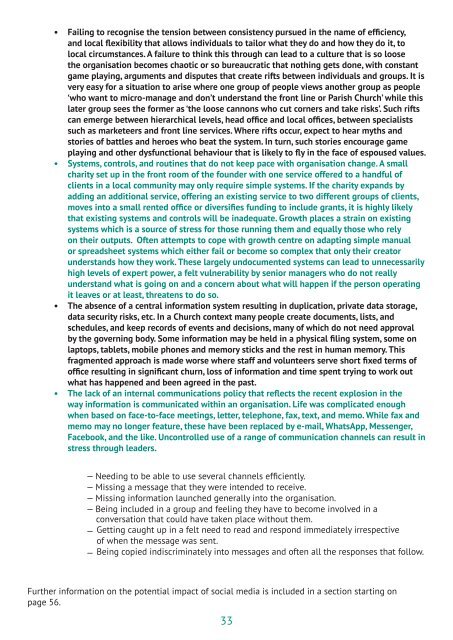Burnout in Churches and Christian Faith-Based Organisations
Burnout is a “syndrome of emotional exhaustion, depersonalization and reduced personal accomplishment that can occur among individuals who work with people in some capacity (Maslach 1996:193). This definition, whilst helpful, fails to convey the potentially life-shattering impact that burnout can have, as described in the words of ‘Peter’, a Christian leader who contributed to this guidance.
Burnout is a “syndrome of emotional exhaustion, depersonalization and reduced personal accomplishment that can occur among individuals who work with people in some capacity (Maslach 1996:193).
This definition, whilst helpful, fails to convey the potentially life-shattering impact that burnout can have, as described in the words of ‘Peter’, a Christian leader who contributed to this guidance.
You also want an ePaper? Increase the reach of your titles
YUMPU automatically turns print PDFs into web optimized ePapers that Google loves.
• Fail<strong>in</strong>g to recognise the tension between consistency pursued <strong>in</strong> the name of efficiency,<br />
<strong>and</strong> local flexibility that allows <strong>in</strong>dividuals to tailor what they do <strong>and</strong> how they do it, to<br />
local circumstances. A failure to th<strong>in</strong>k this through can lead to a culture that is so loose<br />
the organisation becomes chaotic or so bureaucratic that noth<strong>in</strong>g gets done, with constant<br />
game play<strong>in</strong>g, arguments <strong>and</strong> disputes that create rifts between <strong>in</strong>dividuals <strong>and</strong> groups. It is<br />
very easy for a situation to arise where one group of people views another group as people<br />
‘who want to micro-manage <strong>and</strong> don’t underst<strong>and</strong> the front l<strong>in</strong>e or Parish Church’ while this<br />
later group sees the former as ‘the loose cannons who cut corners <strong>and</strong> take risks’. Such rifts<br />
can emerge between hierarchical levels, head office <strong>and</strong> local offices, between specialists<br />
such as marketeers <strong>and</strong> front l<strong>in</strong>e services. Where rifts occur, expect to hear myths <strong>and</strong><br />
stories of battles <strong>and</strong> heroes who beat the system. In turn, such stories encourage game<br />
play<strong>in</strong>g <strong>and</strong> other dysfunctional behaviour that is likely to fly <strong>in</strong> the face of espoused values.<br />
• Systems, controls, <strong>and</strong> rout<strong>in</strong>es that do not keep pace with organisation change. A small<br />
charity set up <strong>in</strong> the front room of the founder with one service offered to a h<strong>and</strong>ful of<br />
clients <strong>in</strong> a local community may only require simple systems. If the charity exp<strong>and</strong>s by<br />
add<strong>in</strong>g an additional service, offer<strong>in</strong>g an exist<strong>in</strong>g service to two different groups of clients,<br />
moves <strong>in</strong>to a small rented office or diversifies fund<strong>in</strong>g to <strong>in</strong>clude grants, it is highly likely<br />
that exist<strong>in</strong>g systems <strong>and</strong> controls will be <strong>in</strong>adequate. Growth places a stra<strong>in</strong> on exist<strong>in</strong>g<br />
systems which is a source of stress for those runn<strong>in</strong>g them <strong>and</strong> equally those who rely<br />
on their outputs. Often attempts to cope with growth centre on adapt<strong>in</strong>g simple manual<br />
or spreadsheet systems which either fail or become so complex that only their creator<br />
underst<strong>and</strong>s how they work. These largely undocumented systems can lead to unnecessarily<br />
high levels of expert power, a felt vulnerability by senior managers who do not really<br />
underst<strong>and</strong> what is go<strong>in</strong>g on <strong>and</strong> a concern about what will happen if the person operat<strong>in</strong>g<br />
it leaves or at least, threatens to do so.<br />
• The absence of a central <strong>in</strong>formation system result<strong>in</strong>g <strong>in</strong> duplication, private data storage,<br />
data security risks, etc. In a Church context many people create documents, lists, <strong>and</strong><br />
schedules, <strong>and</strong> keep records of events <strong>and</strong> decisions, many of which do not need approval<br />
by the govern<strong>in</strong>g body. Some <strong>in</strong>formation may be held <strong>in</strong> a physical fil<strong>in</strong>g system, some on<br />
laptops, tablets, mobile phones <strong>and</strong> memory sticks <strong>and</strong> the rest <strong>in</strong> human memory. This<br />
fragmented approach is made worse where staff <strong>and</strong> volunteers serve short fixed terms of<br />
office result<strong>in</strong>g <strong>in</strong> significant churn, loss of <strong>in</strong>formation <strong>and</strong> time spent try<strong>in</strong>g to work out<br />
what has happened <strong>and</strong> been agreed <strong>in</strong> the past.<br />
• The lack of an <strong>in</strong>ternal communications policy that reflects the recent explosion <strong>in</strong> the<br />
way <strong>in</strong>formation is communicated with<strong>in</strong> an organisation. Life was complicated enough<br />
when based on face-to-face meet<strong>in</strong>gs, letter, telephone, fax, text, <strong>and</strong> memo. While fax <strong>and</strong><br />
memo may no longer feature, these have been replaced by e-mail, WhatsApp, Messenger,<br />
Facebook, <strong>and</strong> the like. Uncontrolled use of a range of communication channels can result <strong>in</strong><br />
stress through leaders.<br />
— Need<strong>in</strong>g to be able to use several channels efficiently.<br />
— Miss<strong>in</strong>g a message that they were <strong>in</strong>tended to receive.<br />
— Miss<strong>in</strong>g <strong>in</strong>formation launched generally <strong>in</strong>to the organisation.<br />
— Be<strong>in</strong>g <strong>in</strong>cluded <strong>in</strong> a group <strong>and</strong> feel<strong>in</strong>g they have to become <strong>in</strong>volved <strong>in</strong> a<br />
conversation that could have taken place without them.<br />
— Gett<strong>in</strong>g caught up <strong>in</strong> a felt need to read <strong>and</strong> respond immediately irrespective<br />
of when the message was sent.<br />
— Be<strong>in</strong>g copied <strong>in</strong>discrim<strong>in</strong>ately <strong>in</strong>to messages <strong>and</strong> often all the responses that follow.<br />
Further <strong>in</strong>formation on the potential impact of social media is <strong>in</strong>cluded <strong>in</strong> a section start<strong>in</strong>g on<br />
page 56.<br />
33



